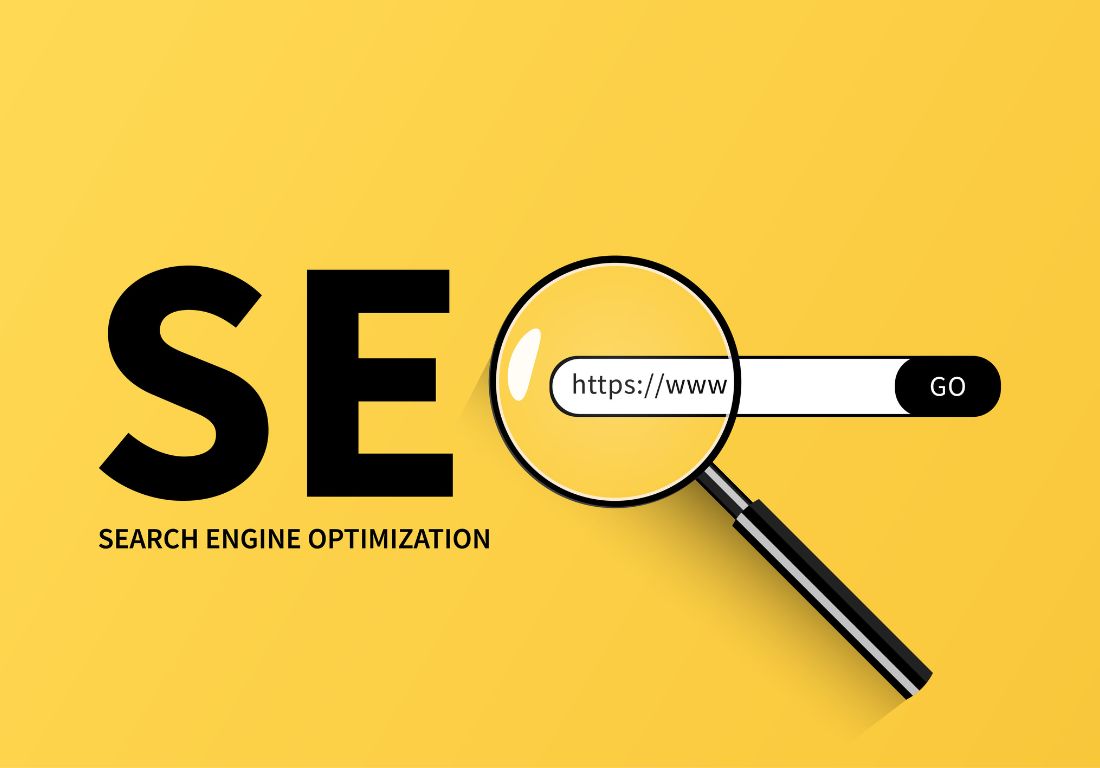
Embarking on the thrilling journey of SEO can be both exciting and overwhelming, especially for SEO beginners navigating the vast digital landscape.
In a world where online visibility is crucial, understanding the basics of Search Engine Optimization (SEO) is paramount for anyone looking to make their mark on the web as an SEO beginner. Fear not, as this article is your ultimate guide, offering actionable tips in a language that’s easy for SEO beginners to grasp.
Whether you’re a small business owner, a blogger, or just someone curious about boosting your online presence, we’ve got you covered as SEO beginners. From deciphering the mysteries of keywords to demystifying the ever-elusive algorithms, we’ll break down the essentials of SEO for SEO beginners simply and professionally.
Get ready, SEO beginners, to enhance your digital footprint and climb the ranks of search engine results with practical insights that even the greenest SEO beginners can implement effortlessly. Let’s discuss the nine actionable tips that SEO beginners can implement for higher rankings!
What Is SEO?

What Is Search Engine Optimization (SEO)?
Search Engine Optimization (SEO) is akin to securing a golden ticket for your website to the bustling online soirée hosted by search engines. The fundamental process involves strategically aligning your content with user queries on search engines.
Picture keywords as the essential language of this conversation; they serve as the bridge between what users are searching for and the content on your site. Ensuring your website structure is seamless and user-friendly is like being the host of an effortlessly chic gathering – everyone enjoys themselves, including search engine bots.
In the realm of SEO, backlinks play the role of recommendations from peers. The more recommendations (or backlinks) your website garners, the more favorable your reputation becomes in the digital social scene. Page speed is akin to ensuring the entrance to your virtual gathering is swift, preventing any frustrating wait times.
Lastly, at the heart of SEO success is consistently delivering fresh, high-quality content.
This content is the lifeblood of your online presence, keeping your website relevant, engaging, and, ultimately, on the VIP list of search engine results. In essence, mastering SEO involves orchestrating a harmonious blend of keywords, structure, backlinks, page speed, and compelling content to ensure your website is the undeniable star of the digital party.
How Should SEO Beginners Start?
- Step 1: Define Your Niche: Identify what makes you stand out in the vast digital landscape. SEO beginners must pinpoint their niche to tailor strategies that resonate with potential clients.
- Step 2: Keyword Research: As SEO beginners, dive into keyword research. It’s like learning the language your clients speak online. Understand the terms they use to search for services, integrating them naturally into your content.
- Step 3: SEO-Optimize Your Website: Craft a user-friendly website – a digital storefront for SEO beginners. Ensure it’s optimized with SEO’s best practices, making it easy for potential clients to find you.
- Step 4: Create Valuable Content: As SEO beginners, consistently produce content that showcases your expertise. Blog posts, guides, or videos – let your content speak to SEO beginners and establish you as an authority.
- Step 5: Engage on Social Media: Be present on social platforms. Connect with potential clients, share insights, and participate in relevant discussions. It’s like networking at a digital cocktail party.
- Step 6: Build Backlinks: Expand your online reach. Secure backlinks from reputable sources. It’s like having influential friends vouch for you in the digital world.
- Step 7: Encourage Review: Prioritize client feedback. Positive reviews act as digital testimonials, building trust. It’s akin to word-of-mouth recommendations in the virtual realm.
By following these steps, SEO beginners can confidently pave their way to booking clients and establishing a robust online presence. Remember consistency, and authenticity are key to success in this digital journey for SEO beginners’ journey!
9 SEO Beginners Tips For Higher Rankings
1. Claim & Optimize Your Google MyBusiness
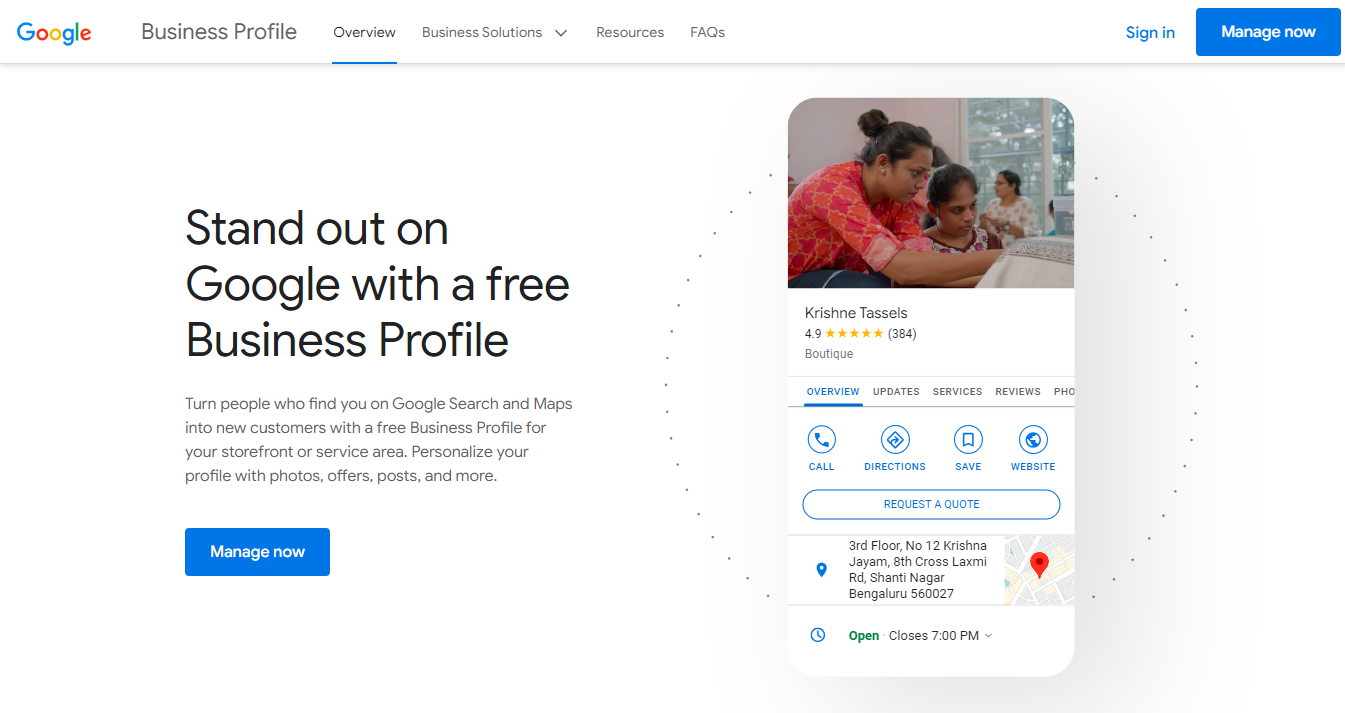
Google MyBusiness
The Google Business Profile is like your online business calling card that pops up when people Google your brand. You’ve probably noticed it while checking out a restaurant or searching for directions. Snagging your Google Business Profile is a quick win – it’s free and gets your info out there fast.
Claiming (or making) your profile isn’t rocket science, and it’s a smart move for your SEO game. It’s like telling Google and users, “Hey, here’s the scoop on my company – no need to search high and low.”
But here’s the secret sauce: Keep that profile alive and kicking. Respond to reviews, spill the beans on company news, turn on text messaging, and keep your hours up-to-date for holidays. The more TLC you give your Google Business Profile, the more love you get in return.
2. Place keywords in the right places
Effectively incorporating SEO keywords involves precise placement across various elements.
Begin by strategically embedding them in page titles and meta descriptions, signaling relevance to search engines and users. Within the body, distribute keywords naturally, especially in the opening paragraphs and subheadings (H2 and H3 tags). Ensure they align with the content’s context, enhancing both SEO and readability.
Alt text for images and URL slugs provide additional opportunities for keyword inclusion. Like how we have done below with a Backlinko image. You can see the alt text by hovering your cursor over it.
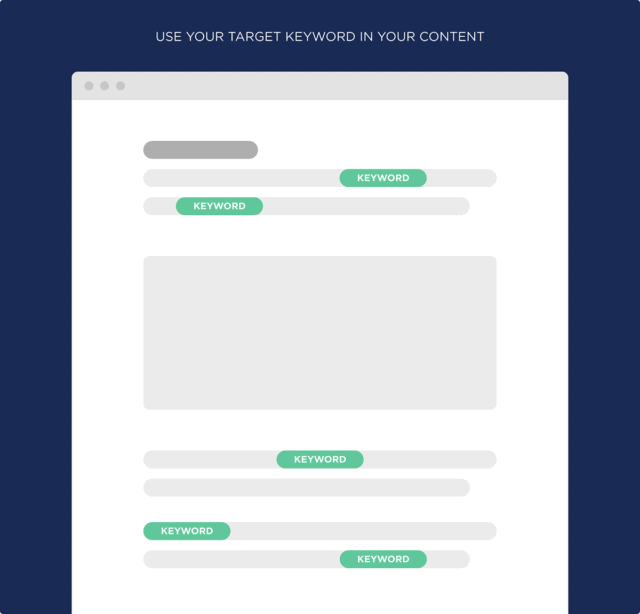
SEO Beginners Tip – Placing Keywords Rightly
(source: Backlinko)
Thoughtful placement in these key areas fosters a comprehensive SEO strategy, elevating your content’s visibility and resonance with your target audience.
3. Pick long-tail keywords over short-tail keywords as they’re easier to rank
If you want folks to discover your website (and see your content pop up in search results), you’ve got to track down the right keywords, understand what users are searching for, and weave those words into your meta tags and content.
Before you dive into keyword research, let’s chat about the difference between long-tail and short-tail keywords:
Long-tail keywords: Think of these as more detailed queries, like “best ways to decorate a small apartment.”
Short-tail keywords: These are the shorter, snappier terms, such as “apartment decor.”
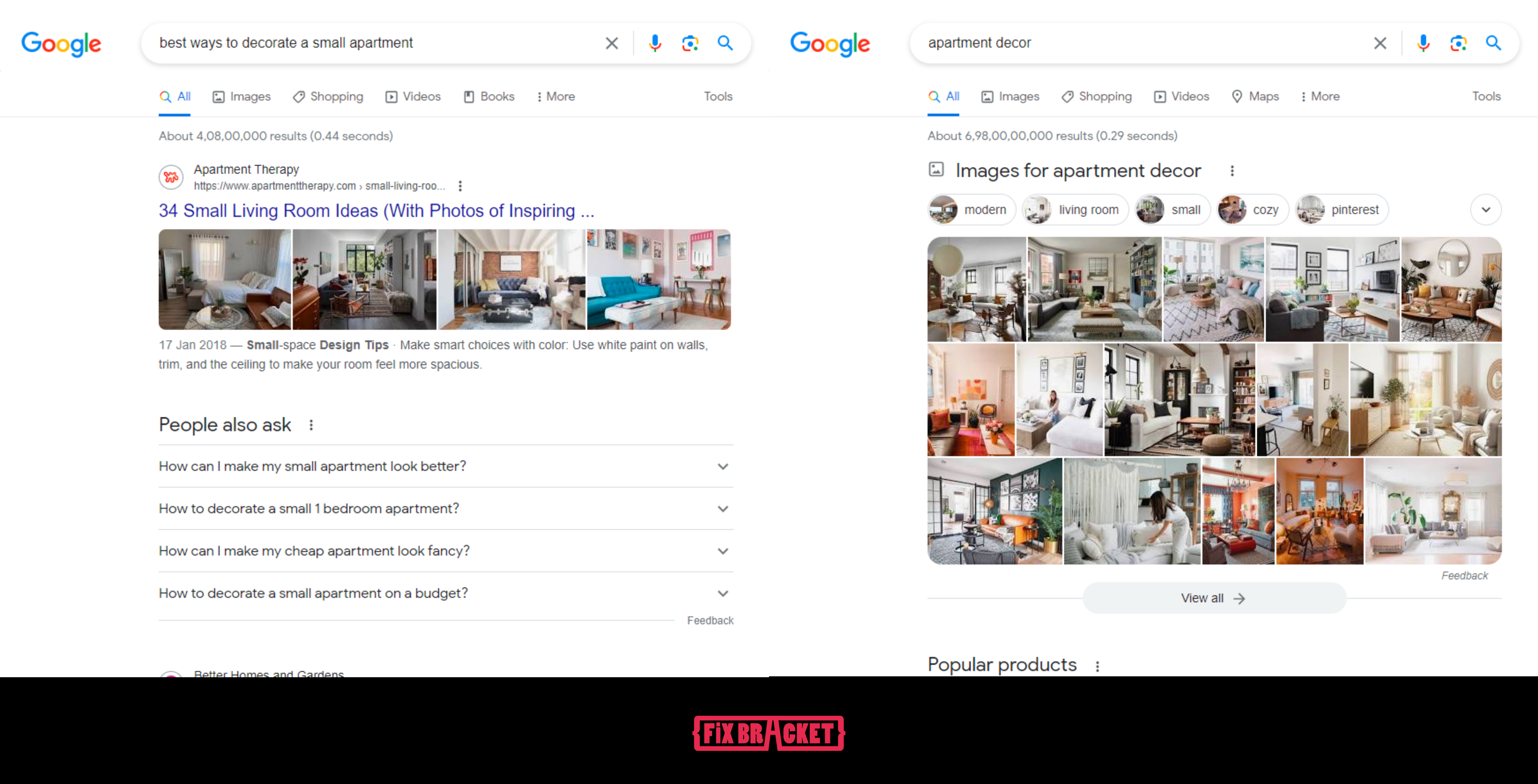
Long-tail vs Short-tail tip for SEO beginners
If you’re just starting with SEO for your website, focus on hunting down long-tail keywords. They’re a bit longer (hence the name), which means there’s less competition. This makes it a smoother journey to get your content noticed and ranked. So, pick your keywords wisely, and let’s get your website shining in those search results!
4. Link your blogs as internal links
Alright, picture your blogs like a network of friends at a party. When you link them internally, it’s like introducing your pals to each other. Search engines see these connections as a thumbs-up, boosting your website’s credibility. For SEO beginners, this practice helps search engines navigate your site better, enhancing user experience.
Plus, it keeps visitors happily mingling between your awesome blog posts, making your website the go-to spot in the digital shindig. It’s like throwing a great party – connections and good vibes all around!
5. Update old pages/blogs
Imagine your website as a living garden. Just like plants need care, your old pages and blogs crave attention. When you update them, it’s like giving them a fresh drink of water. Search engines love this because it shows your content is current and relevant. It’s not just about sprucing up; it’s about signaling to search engines that your garden is thriving.
So, for SEO beginners, tending to those older pages is like ensuring your digital garden stays lush, attracting more visitors, and impressing search engines with your green thumb.
6. Optimize meta description properly
Optimizing the meta description is a pivotal strategy for SEO beginners seeking higher search engine rankings. Consider this element as the concise elevator pitch of your web page to search engines.
Strategically incorporating the focus keyword, preferably once, communicates the relevance of the content to search bots, essentially serving as a spotlight. To enhance the meta description further, integrating the secondary keyword once or twice adds an extra layer of sophistication.
This process not only refines the signaling of content authenticity but also contributes to search engine algorithms comprehending the thematic relevance of the page.
Maintaining brevity within the recommended 160 characters ensures optimal user engagement while still effectively conveying the content’s significance through carefully chosen keywords. Mastering this art can significantly elevate your rankings in search results.
7. Mention the keyword in the URL of your blog
We’re gonna reveal a little secret of ours here.
We’ll simply explain the point that you should mention the keyword that you’re primarily optimizing for in your blog URL and title. In our blog on how link-building strategy works for SEO, our primary focus keyword was ‘link-building strategy’, which is like a medium-tail keyword. We’ve mentioned it in the URL and the blog title.
Here’s a picture showing the same:
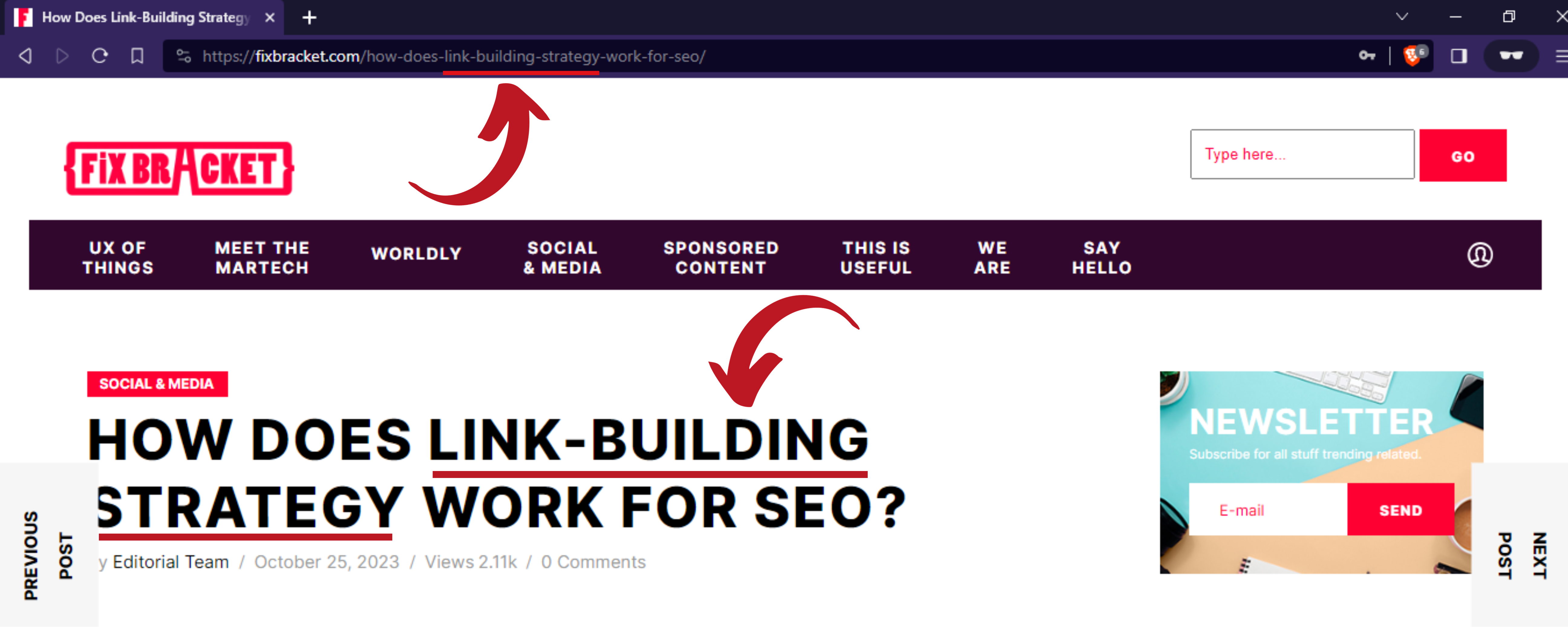
Mention the Focus Keyword In The Blog URL & Title
Ever notice how Google tends to boost blogs that have the focus keyword in both the URL and title? It’s not a coincidence. For SEO beginners, this is like signaling to Google, “This blog is precisely what you’re after!”
Technically, search engines interpret the presence of the keyword in both the URL and title as a strong indicator of relevance. Think of it as a virtual handshake, immediately linking your content to user queries.
So, when crafting your blog, make sure the focus keyword takes center stage in both the URL and title – it’s the key ingredient for securing a higher rank on Google.
8. Create long-form content or in-depth guides
Opting for longer blog posts isn’t just about word count; it’s an SEO game-changer.
For SEO beginners, longer content provides a deeper dive into topics, making it a valuable resource for readers. Search engines adore this because it signals authority and thoroughness. Think of it as serving a feast of information rather than a snack. Longer blogs naturally include more keywords, improving your chances of ranking higher.
Plus, users tend to spend more time on comprehensive content, a metric search engines love. In essence, for SEO success, consider your blogs’ in-depth guides rather than quick reads.
9. Don’t overoptimize! 1.5% keyword density is the sweet spot.
The last point is the complete opposite of the least. SEO beginners usually overoptimize their blogs by mentioning the focus keywords a lot more times than needed. This is called keyword stuffing.
Generally in the marketing world, it is accepted that the keyword density should be no less than 1%. In that way, Google may not even understand which keyword you’ve optimized for. If your 1000-word blog has your focus keywords mentioned more than 200 times or more than 2%, you start entering the danger zone of keyword stuffing. It’s still fine, however, I believe the sweet spot is around 1.5% to 1.8%.
Bonus Tip: Secure A Backlink
If another website, especially one with a high domain authority (DA), hyperlinks (like this) your domain’s link to their blog, then that’s the biggest boost you can get. This will boost your own DA score.
The easiest and the most profitable way of securing a backlink for your blog would be to write an email about it to
editor@fixbracket.com and someone from Fixbracket – Business Marketing Blog will get back to you.
What’s in it for you?
We’ll write a promotional piece of content and publish it from our website in return for you publishing a blog from your domain and providing us with a backlink. And we’ll give you a backlink to you, so it’s a win-win-win situation, where there are two wins for you!
Conclusion
While the steps above help kickstart your SEO strategy, remember, that SEO is like a complex puzzle with many pieces. It requires ongoing effort and dedication. Some companies even have whole teams just for SEO.
The bright side?
You don’t have to figure it all out alone. Take advantage of our starter pack to elevate your SEO game and increase your chances of landing your website on that coveted first page of search engine results. Keep learning, and keep optimizing!
People Also Read:
How Does Link-Building Strategy Work For SEO?
Reddit Betting on AI Keyword Research Tool For SEO.
Domain Authority (DA): How It Affects Your Business More Than You Think
5 Ecommerce SEO Truths To Boost Sales




